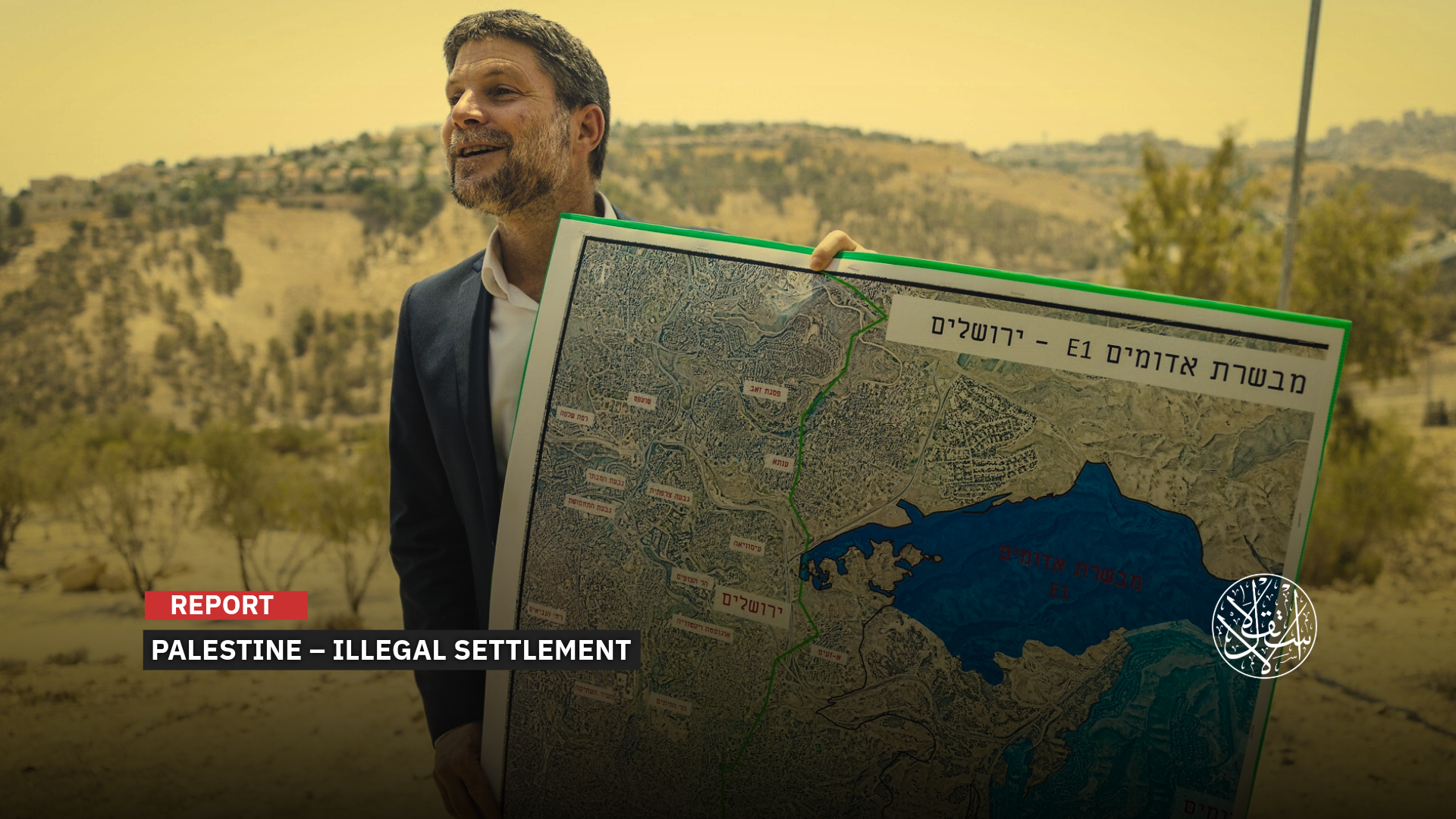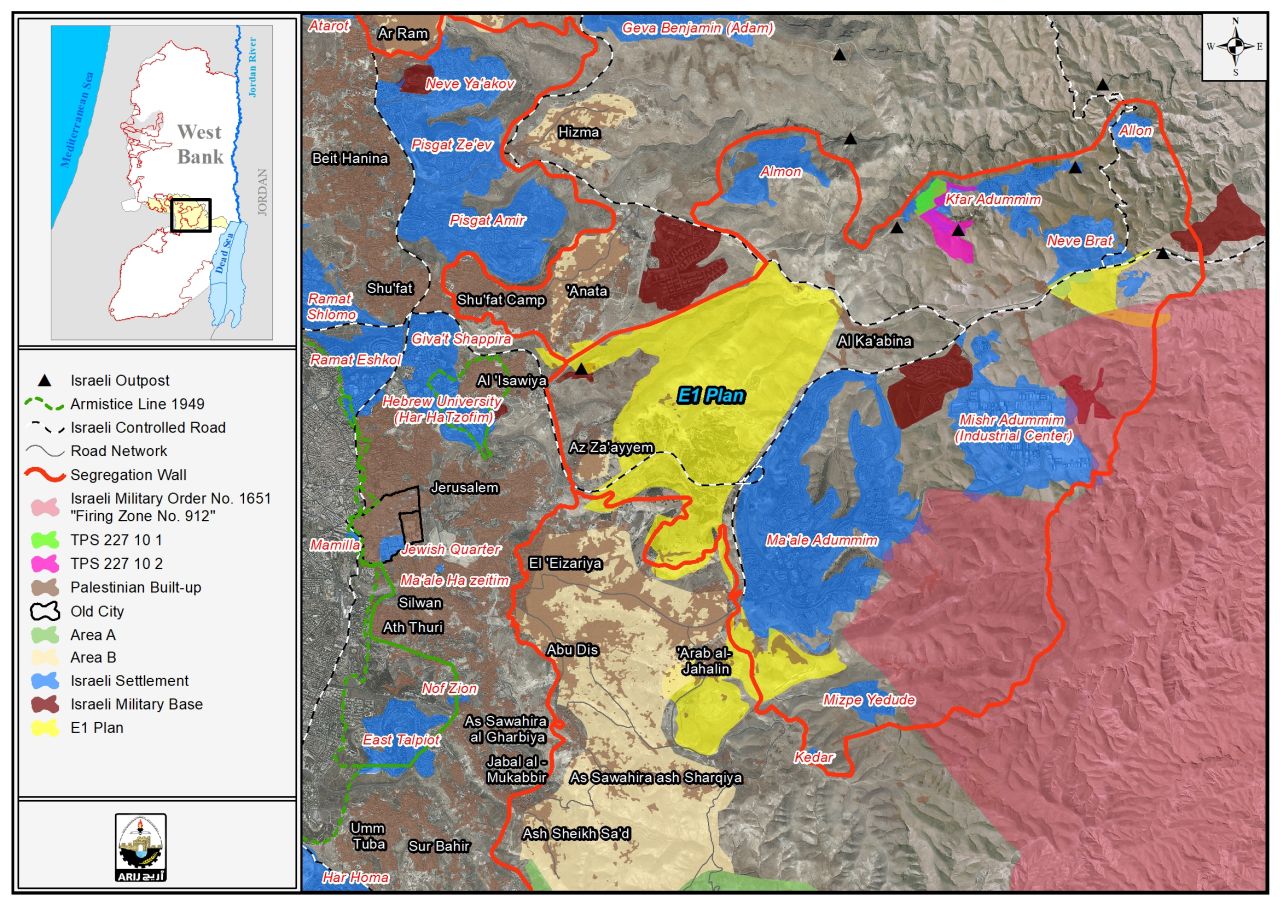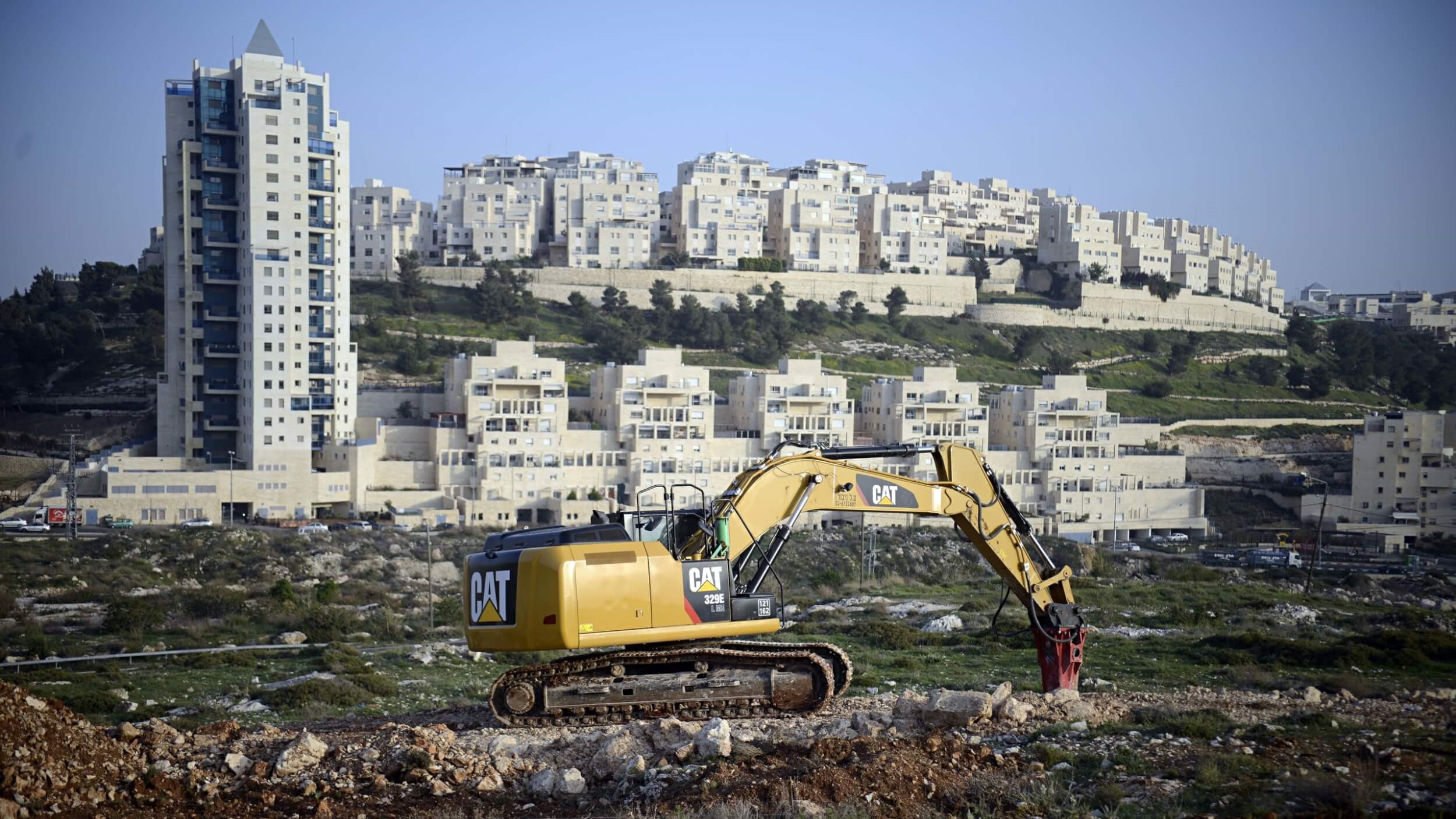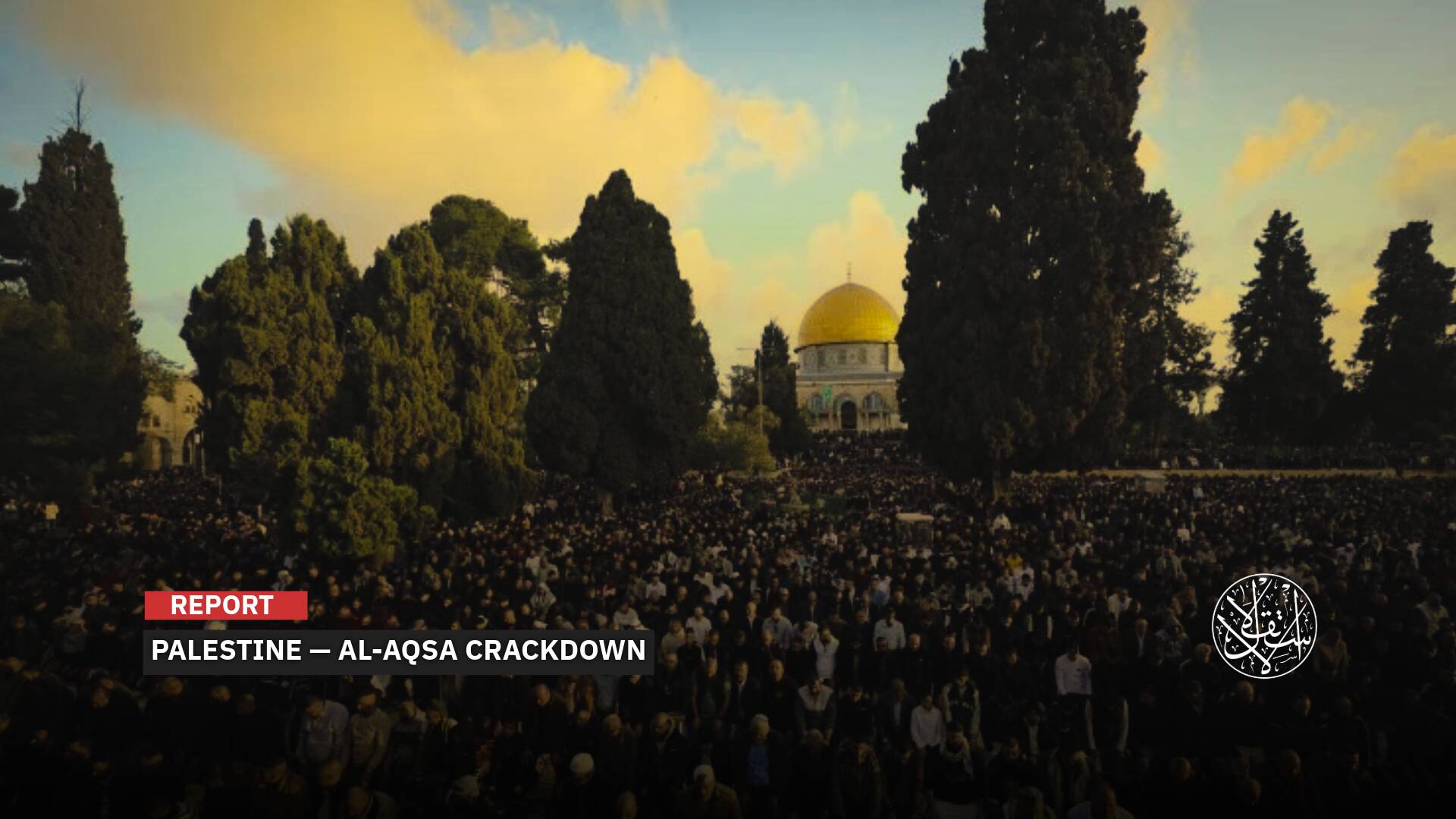The E1 Project: How the Israeli Government Plans to Bury the Idea of a Palestinian State

“Critics characterized the E1 plans as a death blow to the two-state solution.”
In parallel with the ongoing escalation in the Gaza Strip, Israeli forces have escalated their operations in the occupied West Bank, forcing tens of thousands of Palestinians living in refugee camps to flee and completely destroying others.
This coincided with record settlement expansion, with approximately 770,000 settlers residing in 180 settlements and more than 250 outposts.
This has also been accompanied by the confiscation of approximately 52,000 dunams of land, and the establishment of approximately 900 military checkpoints to isolate the occupied Palestinian territories from each other.
In the latest measure in this regard, “Israel” has officially approved a settlement project that paves the way for the complete absorption of Jerusalem and the transformation of the occupied West Bank into two parts connected only by underground tunnels.
Haaretz newspaper noted that this controversial project, which has been postponed for years due to international pressure, has broad implications for the possibility of achieving a two-state solution and is expected to spark sharp criticism.
The E1 Project
Despite the condemnations and denunciations that erupted after Israeli Prime Minister Benjamin Netanyahu announced his plan to reoccupy Gaza and then spoke of what he called “Greater Israel”, Finance Minister Bezalel Smotrich recently announced the commencement of work on a settlement project after more than 20 years of political stagnation.
Smotrich has repeatedly pressured Netanyahu to annex the occupied West Bank and apply Israeli sovereignty over all of its territory.
In this regard, on August 20, the Israeli military's Supreme Planning Council approved a settlement construction plan in the E1 area, which would separate the northern and southern parts of the occupied West Bank.
The E1 area, which covers an area of 12,000 dunams, is located between three major cities in the occupied West Bank (Ramallah, East Jerusalem, and Bethlehem), and is home to approximately one million Palestinians.
Smotrich, who also chairs the Army Ministry's Subcommittee on Settlement Affairs, subsequently stated that the erasure of a Palestinian state can only be achieved through actions, not slogans.
“Those working to increase international recognition of a Palestinian state next September will discover that they have nothing to recognize,” he added.
On August 13, Smotrich proposed a project to build 3,401 units between East Jerusalem and the settlement of Ma’ale Adumim.
He asserted that “Israel” would double the size of the Ma'ale Adumim settlement, noting that it was confiscating thousands of dunams and investing billions to bring a million settlers into the West Bank.
He indicated that the project was part of the Israeli government's de facto sovereignty plan, asserting that the plan would sever the connection between Ramallah and Bethlehem in the West Bank.
He also emphasized that PM Benjamin Netanyahu and US President Donald Trump had supported reviving the E1 plan, although neither had yet confirmed it.
Israel Gantz, head of the West Bank Regional Council, said that the announcement brings “Israel” closer to establishing full sovereignty over the West Bank.
Settlement construction plans in the E1 area were drawn up during the late Prime Minister Yitzhak Rabin's term in 1994, but were frozen for several years due to international objections that viewed the project as a threat to any future peace agreement with the Palestinians.
“Alongside the proposed Israeli takeover of Gaza City, the promise by Smotrich that 2025 would be Israel’s Year of Sovereignty – and with it the end of a future Palestinian state – appears to be coming ever closer,” Palestinian journalist Iyad Hamad explained to Al-Estiklal.
“The E1 settlement project represents the most dangerous link in Israeli expansion and reflects the Netanyahu government's insistence on pursuing the so-called Greater Israel project,” he added.
He also pointed out that the resumption of construction in the E1 area after years of freeze confirms that “Israel” is no longer concerned with international pressure or sanctions, given that it has received an US green light to implement this malicious plan.

Demographic Change
The E1 plan has met with widespread opposition from the EU and Arab and Islamic countries, which have issued repeated statements condemning the plan and calling on “Israel” to withdraw it because it undermines the establishment of any Palestinian state.
The U.S. has also expressed reservations on several occasions, while the Palestinian Authority has considered it a declaration of war on the two-state solution and a systematic destruction of any future peace process.
Egypt also condemned the Israeli plan, believing it reflects the government's insistence on changing the demographic status of the occupied territories.
The Jordanian Foreign Ministry described Netanyahu's statements as a dangerous, provocative escalation, a threat to state sovereignty, and a violation of international law and the UN Charter.
Saudi Arabia reiterated its categorical rejection of Israeli policies based on settlement construction and forced displacement, calling on the international community to compel “Israel” to halt its illegal violations in the West Bank and East Jerusalem.
For his part, British Foreign Secretary David Lammy condemned the Israeli settlement plan, noting that it would divide the Palestinian state in two and asserting that its implementation constitutes a flagrant violation of international law.
EU High Representative for Foreign Affairs Kaja Kallas called on “Israel” to withdraw from the project, pointing to its far-reaching repercussions.
The Turkish Ministry of Foreign Affairs condemned the settlement project, stating that this step disregards international law and targets Palestinian hopes for lasting peace.
Spain considered Israel's decision on settlements a new violation of international law, and its Foreign Minister Jose Manuel Albares Bueno said that the new construction undermines the path to a two-state solution.
The German Foreign Ministry categorically rejected the E1 project and called on the Israeli government to immediately halt settlement activity, stating that it considers settlements a violation of international law.
Italian Foreign Minister Antonio Tajani condemned the Israeli decision, describing it as unacceptable, contrary to international law, and threatening to undermine the two-state solution.
UN Secretary-General Antonio Guterres warned that the construction of Israeli settlements there would end hopes for a two-state solution to end the Palestinian-Israeli conflict.
Stephane Dujarric, Spokesman for the UN Secretary-General, stated that settlement expansion in the E1 area would destroy the two-state solution and called on the Israeli government to halt all settlement activity that violates international resolutions.
Peace Now, an organization that tracks settlement expansion in the West Bank, strongly criticized Smotrich's proposal, considering it a death blow to Israel's future and any chance of achieving a peaceful two-state solution.
It stated that infrastructure work in the E1 area could begin within a few months, and that housing construction would begin within about a year.
Breaking the Silence, an Israeli rights group founded by former Israeli soldiers, also called the plan a land grab which will not only further fragment the Palestinian territory, but will reinforce the apartheid regime.
Ir Amim, an Israeli organization that monitors developments in and around Jerusalem, warned that Jewish settlements in the E1 area will permanently entrench the Israeli occupation of the West Bank, leading to further violence.

Illegal Settlement
In addition to settlement projects, settler militias have been observed intensifying their attacks and assaults on Palestinian towns in the occupied West Bank, such as the village of Duma, south of Nablus, and Atara and Abu Falah near Ramallah.
The Palestinian Ministry of Foreign Affairs condemned what it described as ongoing settler terrorism, considering it the result of ongoing incitement by ministers in the extremist Israeli government.
The UN Office for the Coordination of Humanitarian Affairs estimates that an average of four settler attacks on Palestinians in the West Bank occur daily.
Last year, the International Court of Justice (ICJ) issued an advisory opinion declaring the occupation of all Palestinian territories occupied by “Israel” in 1967 illegal.
“Israel” rejects the ICJ opinion, claiming that the Geneva Conventions prohibiting settlements in occupied territories do not apply to it, a view disputed by many of its allies, as well as international lawyers.
Most countries consider settlements in the occupied West Bank, which Israel captured in the 1967 war, to be illegal under international law.
Approximately 770,000 Israeli settlers live among 2.7 million Palestinians in the occupied West Bank and East Jerusalem.
“Israel” has also annexed East Jerusalem in a move not recognized by most countries, but it has not yet formally extended its sovereignty over the occupied West Bank.
The UN and most global powers say that settlement expansion erodes the viability of a two-state solution by fragmenting the Palestinian territories.
The settlement issue is also one of the most contentious issues between Palestinians and Israelis, and a major reason for the stalled peace negotiations between the two sides, which have been stalled since 2014.
On May 29, “Israel” approved the largest expansion of Jewish settlements in the West Bank since the signing of the Oslo Accords more than 30 years ago.
The Israeli cabinet announced that it would establish 22 new settlements, some deep within the West Bank and others in areas from which “Israel” had previously withdrawn.
On July 23, the Israeli Knesset voted in favor of a proposal calling on the government to annex the West Bank and the Jordan Valley and to nullify any plan to establish a Palestinian state.

Separately, security sources revealed that settler groups are planning to carry out a series of attacks against Palestinians residing in the occupied West Bank, especially ahead of the Jewish holidays in September and October.
This comes in light of the Israeli authorities imposing new conditions regarding the return of Palestinians who were forced to flee again from refugee camps in the northern West Bank, specifically Jenin, Tulkarm, and Nur Shams.
These three camps have been subjected to a large-scale Israeli military operation for several months. Most of the homes in these camps have been destroyed, and new roads have been paved in line with Israeli security and settlement plans.
Army Minister Israel Katz recently stated that Israeli troops will remain deployed in the refugee camps in the northern West Bank until at least the end of the year.
Human rights organizations accuse Israeli security forces of failing in their legal duty as occupying powers to protect Palestinians and their own citizens alike—not only by turning a blind eye to settler attacks, but even by participating in them.
At least 968 Palestinians have been killed by Israeli soldiers or settlers since the outbreak of the Gaza war on October 7, 2023, according to AFP.
Sources
- Israel Approves Settlement Construction Dividing West Bank; Smotrich: 'Erasing Palestinian State'
- Israel approves illegal settlement plan that would split occupied West Bank
- Explainer: Why Israel's E1 settlement plan is sparking outrage
- Condemnation mounts over Israel's E1 Jewish settlement plan in occupied Palestinian territories










